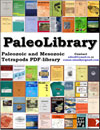
Complete Data Base of Paleozoic and Mesozoic Tetrapods.
Paleo-News and illustrations. Big electronic PDF-library.
| |
| PaleoNews |
| Classification |
| Books and Articles |
| Contact |
| Forum |
сайт о динозаврах
рейтинг сайтов
Free Counter
myspace hit counter
An Unexpected Early Rhabdodontid from Europe (Lower Cretaceous of Salas de los Infantes, Burgos Province, Spain) and a Re-Examination of Basal Iguanodontian Relationships. |
June 30 , 2016 Disarticulated and incomplete remains from a new diminutive ornithopod are described. They come from the Cameros Basin in the north of Spain and were collected from the red clays of the Castrillo de la Reina Formation, ranging from Upper Barremian to Lower Aptian. The new ornithopod described here is slender and one of the smallest ever reported. An up-to-date phylogenetic analysis recovers this taxon as a basal iguanodontian. Its unique combination of characters makes it more derived than slender ornithopods like Hyphilophodon and Gasparinisaura, and bring very interesting insights into the basal iguanodontian phylogeny. Though possessing a minimum of three premaxillary teeth, this taxon also bears an extensor ilio-tibialis groove on the distal part of its femur. Moreover, its dentary and maxillary teeth are unique, remarkably similar to those regarded as having a “rhabdomorphan” affinity. This unknown taxon is suggested to be a stem taxon within Rhabdodontidae, a successful clade of basal iguanodonts from the Late Cretaceous of Europe. The Gondwanan ornithopods share the strongest affinities with this family, and we confirm Muttaburrasaurus as a sister taxon of the Rhabdodontidae within a newly defined clade, the Rhabdodontomorpha. Paul-Emile Dieudonné , Thierry Tortosa, Fidel Torcida Fernández-Baldor, José Ignacio Canudo & Ignacio Díaz-Martínez (2016)
|
